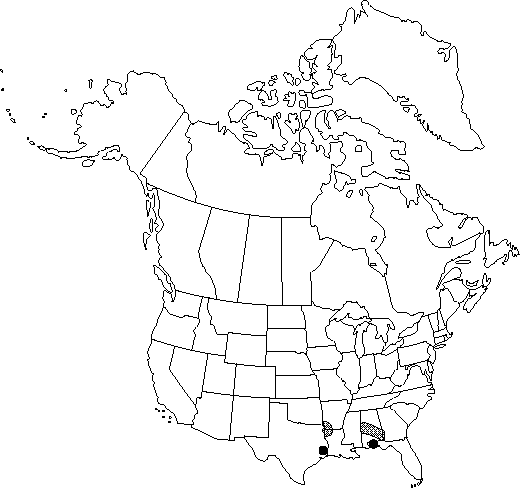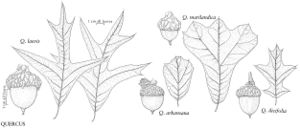Quercus arkansana
Trees & Shrubs 2: 121. 1911.
Trees, deciduous, to 15 m. Bark black with long rough ridges separated by deep furrows. Twigs 1.5-3 mm diam., gray-pubescent, rarely glabrate. Terminal buds redbrown, ovoid, 2-5 mm, glabrous or with scales somewhat ciliate on margins, especially at apex. Leaves: petiole 5-25 mm, pubescent, rarely glabrate. Leaf-blade rhombic to obovate or obtrullate, 50-150 × 35-100 mm, base acute to cordate, margins entire or with 2-3 shallow lobes and up to 10 awns, apex broadly obtuse to rounded; surfaces abaxially uniformly pubescent to glabrous except for conspicuous axillary tufts of tomentum, veins prominent, adaxially planar or somewhat rugose with a few persistent hairs near base. Acorns biennial; cup thin, shallow goblet to almost saucer-shaped, 5-9 mm high × 10-16 mm wide, covering 1/4-1/2 nut, outer surface puberulent, inner surface sparsely to uniformly pubescent, scale tips appressed, acute; nut broadly ellipsoid to subglobose, 10-15 × 9-15 mm, puberulent, scar diam. 5-10 mm.
Phenology: Flowering spring.
Habitat: An understory tree of well-drained, sandy soils, on ravine heads (pocosins, steepheads)
Elevation: 50-150 m
Distribution

Ala., Ark., Fla., Ga., La., Tex.
Discussion
Quercus arkansana reportedly hybridizes with Q. incana (= Q. ×venulosa Ashe) and Q. nigra (D. M. Hunt 1986; W. H. Duncan and M. B. Duncan 1988). While agreeing that an isotype of the former clearly indicated a relationship to Q. arkansana, E. J. Palmer (1948) questioned the identity of the second parent and noted that venulosa is a homonym of a fossil species. In addition, D. M. Hunt (1989) cited evidence of hybridization with Q. hemisphaerica, Q. laevis, Q. marilandica, Q. myrtifolia, and either Q. falcata or Q. velutina.
Selected References
None.
